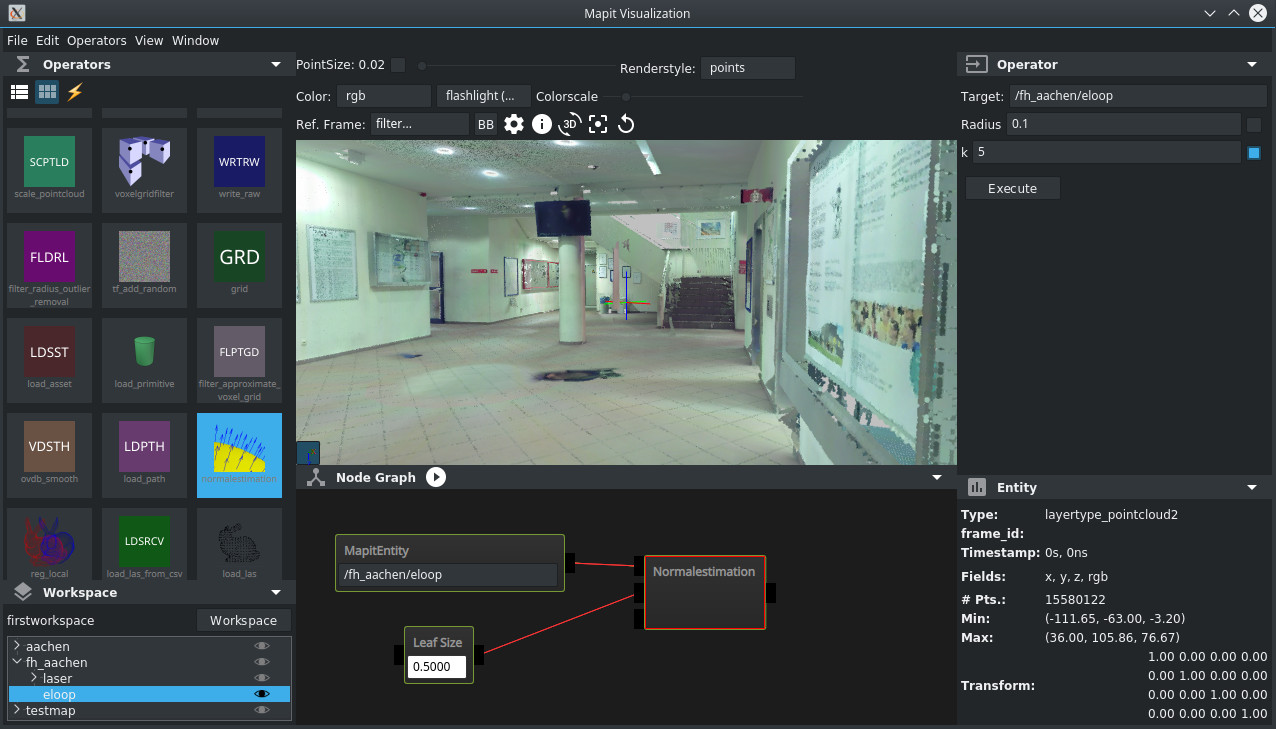Mapit is a framework for storing and managing 3D (or robotic) data and keeping the history of its manipulation in a repository. The data is stored in Entities and is structured in Layers. It comes with a network interface and an QML based GUI which features a multiview approach. With multiview multiple users can display the same data over network, also on a dedicated VR system.
Mapit is used on Ubuntu 16.04, Arch Linux and Fedora 27. The build description for Fedora is given here or in the docker-mapit repo:
dnf install boost-devel eigen3-devel cppzmq-devel OpenEXR-devel \
protobuf protobuf-devel protobuf-lite-devel \
cmake cmake-gui automake libtool gtest-devel gtest wget gcc-c++ \
yaml-cpp-devel libuuid-devel \
git
dnf groupinstall "Development Tools" "Development Libraries"
Because we need the PCL without VTK and SSE we use a self build version
dnf install flann flann-devel libpcap-devel
mkdir ~/ws
cd ~/ws/
git clone https://github.com/PointCloudLibrary/pcl.git
cd pcl/
git checkout pcl-1.8.1
in case you also want the pcl_viewer, you have to compile the pcl twice like the following
dnf install vtk-devel
mkdir build_gui
cd build_gui/
cmake .. -DPCL_ENABLE_SSE=false
make -j8
make -j8 install
dnf remove vtk-devel
dnf install vtk-qt vtk-java vtk-qt-tcl vtk-tcl
cd ..
end case
mkdir build
cd build/
cmake .. -DWITH_VTK=false -DPCL_ENABLE_SSE=false
make -j8
make -j8 install
The detailed ROS installation is described here http://wiki.ros.org/Installation/Source. We used "Desktop Install (recommended)", not full. The tested installation of ROS is the following.
dnf install python-empy poco-devel tinyxml2-devel lz4-devel urdfdom-headers-devel \
qhull-devel libuuid-devel urdfdom-devel collada-dom-devel yaml-cpp-devel \
python-rosdep python-wstool python-rosinstall @buildsys-build \
python2-netifaces pyparsing python3-rosinstall_generator tinyxml-devel \
python-qt5 python-qt5-devel assimp-devel ogre-devel python-defusedxml
mkdir -p /opt/ros/catkin_ws/
chown -R tneumann:tneumann /opt/ros/
cd /opt/ros/catkin_ws/
rosdep init
rosdep update
rosinstall_generator desktop --rosdistro kinetic --deps --wet-only --tar > kinetic-desktop-wet.rosinstall
wstool init -j8 src kinetic-desktop-wet.rosinstall
rosinstall_generator pcl_conversions --rosdistro kinetic --deps --wet-only --tar > kinetic-pcl_conversions-wet.rosinstall
wstool merge -t src kinetic-pcl_conversions-wet.rosinstall
wstool update -t src
rosdep install --from-paths src --ignore-src --rosdistro kinetic -y
now there are some packages to be fixed:
in src/geometric_shapes/CMakeLists.txt remove "EIGEN3" in context of "catkin_package" and add below find_package(Eigen3 REQUIRED)
in src/collada_urdf/collada_parser/CMakeLists.txt change 2.3 to 2.4
./src/catkin/bin/catkin_make_isolated --install -DCMAKE_BUILD_TYPE=Release
add the following to your ~/.bashrc
echo "source /opt/ros/catkin_ws/install_isolated/setup.bash" >> ~/.bashrc
source /opt/ros/catkin_ws/install_isolated/setup.bash
dnf install blosc-devel blosc cppunit-devel cppunit-devel glfw-devel ilmbase-devel OpenEXR-devel tbb-devel python-devel libXi-devel
cd ws/
git clone https://github.com/dreamworksanimation/openvdb.git
cd openvdb/
git checkout v4.0.2
mkdir build
cd build
cmake .. -DGLFW_LIBRARY_PATH=/usr/lib64/ \
-DIlmbase_IEX_LIBRARY=/usr/lib64/libIex.so \
-DIlmbase_ILMTHREAD_LIBRARY=/usr/lib64/libIlmThread.so \
-DOpenexr_ILMIMF_LIBRARY=/usr/lib64/libIlmImf.so \
-DBLOSC_LOCATION=/usr/ \
-DTBB_LOCATION=/usr/ \
-DCPPUNIT_LOCATION=/usr/ \
-DOPENEXR_LOCATION=/usr/ \
-DILMBASE_LOCATION=/usr/ \
-DUSE_GLFW3=true \
-DGLFW3_LOCATION=/usr/ \
-DOPENVDB_DISABLE_BOOST_IMPLICIT_LINKING=false \
-DOPENVDB_ENABLE_3_ABI_COMPATIBLE=false
make -j8
make install
cd ~/ws
git clone https://github.com/OctoMap/octomap.git
cd octomap
mkdir build
cd build
cmake ..
make -j8
make install
In Fedora 27 it seem to be possible to directly use the system packages, this however is not widly tested
dnf install qt5 qt5-devel
Alternatively the newest version can be installed with the official script
cd ~/tmp
wget http://download.qt.io/official_releases/online_installers/qt-unified-linux-x64-online.run
chmod +x qt-unified-linux-x64-online.run
./qt-unified-linux-x64-online.run
cd ~/ws
git clone https://github.com/dropbox/json11.git
cd json11/
mkdir build
cd build
cmake .. -DCMAKE_CXX_FLAGS="-std=c++11" -DCMAKE_CXX_FLAGS_DEBUG="-g -std=c++11"
make -j8
make -j8 install
cd ~/ws
git clone --recursive git@github.com:MASKOR/mapit.git
ldconfig
updatedb
cd ~/ws/mapit/
mkdir build
cd build
export MAPIT_CMAKE_QT_PATH=<path-to-your-qt-installation>/Qt/5.9.2/gcc_64/
export MAPIT_CMAKE_SOFTWARE_PATH=<path-to-your-ws-directory>/ws
cmake .. -DCMAKE_PREFIX_PATH=$MAPIT_CMAKE_QT_PATH \
-DQt5Core_DIR=$MAPIT_CMAKE_QT_PATH/lib/cmake/Qt5Core \
-DQt5Gui_DIR=$MAPIT_CMAKE_QT_PATH/lib/cmake/Qt5Gui \
-DQt5Network_DIR=$MAPIT_CMAKE_QT_PATH/lib/cmake/Qt5Network \
-DQt5Qml_DIR=$MAPIT_CMAKE_QT_PATH/lib/cmake/Qt5Qml \
-DQt5Quick_DIR=$MAPIT_CMAKE_QT_PATH/lib/cmake/Qt5Quick \
-DQt5Test_DIR=$MAPIT_CMAKE_QT_PATH/lib/cmake/Qt5Test \
-DQt5Widgets_DIR=$MAPIT_CMAKE_QT_PATH/lib/cmake/Qt5Widgets \
-DQt53DCore_DIR=$MAPIT_CMAKE_QT_PATH/lib/cmake/Qt53DCore \
-DCMAKE_CXX_FLAGS="-std=c++11" -DCMAKE_CXX_FLAGS_DEBUG="-g -std=c++11" \
-DCMAKE_BUILD_TYPE=Debug \
-DMAPIT_ENABLE_VISUALIZATION=true \
-DWITH_LAS=false \
-DHAVE_LASZIP=false \
-DMAPIT_ENABLE_OPENVDB=true \
-DMAPIT_ENABLE_OCTOMAP=true
make -j8
This work was funded in part by the German Federal Ministry of Education and Research in the programme under grant 033R126C.
